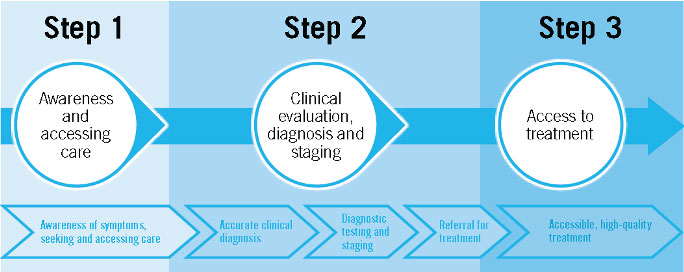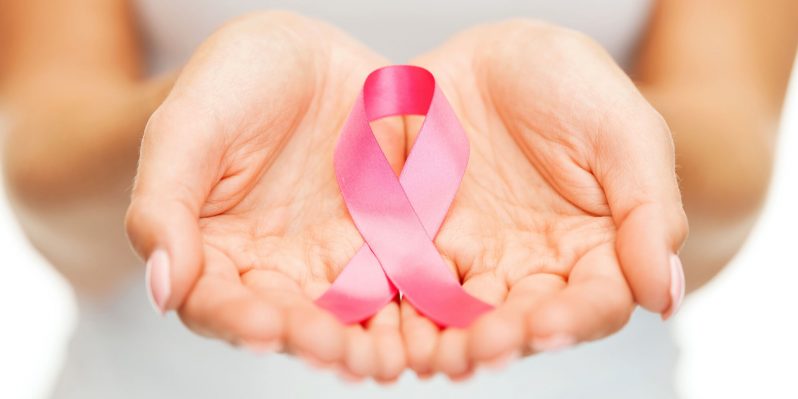-Breast Cancer survivors say life is better than a ‘stigma’
FOR a woman, feeling a lump in your breast is a chilling experience because it is a known symptom of breast cancer, and for some Guyanese women who had that experience, their biggest fears were losing their life or losing their femininity by having their breast(s) removed.
According to the World Health Organisation (WHO), Breast Cancer is the most frequent cancer among women, impacting over 1.5 million women each year and also causing the greatest number of cancer-related deaths among women.
The WHO reported in 2015 that 570,000 women died from breast cancer – that is approximately 15 per cent of all cancer deaths among women. While breast cancer rates are higher among women in more developed regions, rates are increasing in nearly every region globally.
click here to read more about breast cancer
Director of the Cancer Unit and Breast Surgery Service at the Kings County Hospital, USA, Dr. Theophilus Lewis believes the growing number of deaths from breast cancer is mainly because patients are going to hospitals when the cancer is stage three and four instead of detecting the cancer at an early stage.
During an interview with the Guyana Chronicle, Dr. Lewis explained that at the late stages there is very little that can be done other than comforting the patient with chemotherapy. He made reference to studies that revealed that 84 per cent of the people who are diagnosed with stage 4 cancer dies.
“If you feel an abnormality in your breast do not hide it, go see a doctor as early as possible because if you detect it early, for instance at stage one or two, then your chances of survival is high,” the medical expert explained.
The Doctor said he was here with the Organisation for Social and Health Advancement in Guyana (OSHAG) to train local nurses during Breast Cancer awareness month in October, but he believes awareness should be consistent because women need to understand that early detection saves lives.
Anjuli Beharry, Rosaline Clarke and Pat Sailors are living examples of how early detection can create positive results. Though those women had different stories to tell, they were diagnosed with the same malady which could have possibly taken their lives if they did not detect it early.
Sailors, 65, a Cardiopulmonary Resuscitation (CPR) specialist from Georgia Technical Institute in the US said she was diagnosed with stage 2 Breast Cancer in 2013 which progressed rapidly to stage 3 in just a year.

“I was lucky to have detected it early because the doctors said it was growing rapidly…I had to do four months of chemo, 36 days of radiation and delayed reconstruction,” said Sailors who pointed out that when she was first diagnosed with it, it was like someone hit her with a brick.
Three years later, Sailors was however able to share her story with many persons. Her message to women, who are battling the disease, was to be a victor and not a victim. She advised them that they might lose their hair and even their breast but the main thing is being alive to spend another day with the ones you love.
Director of Edward B. Beharry Company Ltd, Anjuli Beharry said when her oncologist diagnosed her with stage 1 Breast Cancer, she felt like it was the end, but the support she got from her loved ones helped her to get through the trying phase.
“When I started doing chemotherapy I started losing my hair so I decided to cut it off…my husband came to see me and the first thing he said was you look beautiful. At that point I felt like I was ready to win against cancer,” said Beharry.
In order to remove the abnormal cell (cancer cell), both of her breasts were removed which made her feel less feminine. As time went by, she explained that she learnt to accept that life is better anything else, so she encouraged persons to support others who might seem to possess an abnormality.
Clarke who is also a survivor of Breast Cancer urged persons to be strong and not be afraid to speak out when they feel something is wrong because if a woman ponders on whether she might lose her femininity, time might go by and it might be too late to treat the cancer.
Data, published in the Ministry of Public Health’s Cancer Surveillance Report in 2015, suggests that between 2003 and 2012 breast cancer was the leading cause of cancer deaths in Guyana.
Based on the data available then, there were 1,090 cases of breast cancer; 1,014 cancer of the cervix cases; 865 cases of prostate cancer; 440 cases of colorectal cancer; 325 cases of cancer of the uterus; 240 cases of stomach cancer; 233 cases of lung cancer; 219 cases of liver cancer; 212 cases of cancer of the ovary and 136 cases of lymphoma.
Dr. Gillisa D’Aguiar, a doctor attached to Georgetown Public Hospital Corporation (GPHC)’s oncology department pointed out at the launch of the breast cancer awareness month that the number of patients who were diagnosed with breast cancer moved from 125 in 2015 to 86 last year and so far for this year 65 new patients have been registered at the GPHC.
Though it is unsure whether the decrease is natural or persons are not coming out to report the cases, the GPHC still continued its sensitisation programme throughout the month and so did major companies such as the Guyana Telephone, Telegraph Company (GTT), Guyana National Newspapers Limited and Non-Governmental Organisations like OSHAG and the Young Pioneers.
The main message that most of those organisations conveyed was that “early detection saves lives.”
According to the WHO, early diagnosis strategies focus on providing timely access to cancer treatment by reducing barriers to care and/or improving access to effective diagnosis services. The goal is to increase the proportion of breast cancers identified at an early stage, allowing for more effective treatment to be used and reducing the risks of death from breast cancer.
Screening consists of testing women to identify cancers before any symptoms appear. Various methods have been evaluated as breast cancer screening tools, including mammography, clinical breast exam and breast self-exam.

In order to limit your chances of getting cancer here are a few things that Pritikin longevity centre SPA believes you can do:
- Be physically active for at least 30 minutes a day
- Limit consumption of calorie-dense foods. Avoid sugary drinks.
- Eat mostly foods of plant origin.
- Limit intake of red meat and avoid processed meat.
- Limit alcoholic drinks.




.png)









